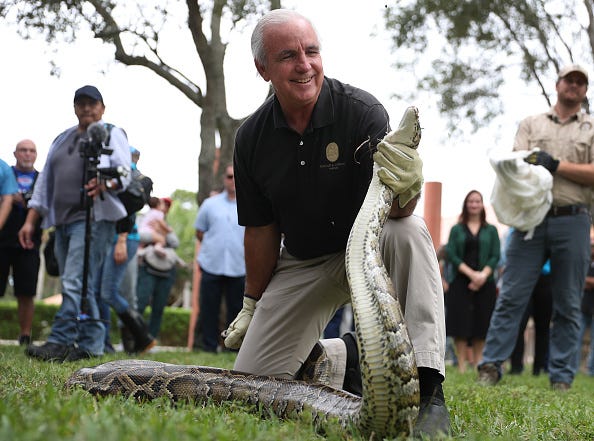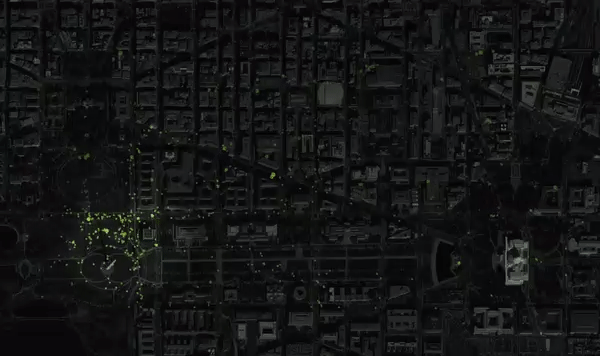What Is That In Thine Hand?
May 21, 2021

Dear Readers,
Yesterday on CNN, a Florida congressman offered a provocative defense of former President Trump’s culpability for the assault on Congress.
“I voted not to impeach the president because I don’t think he incited the events that happened,” said Rep. Carlos Gimenez (R, FL-26), summing up his argument before launching into his startling evidence: “I know for a fact that I saw people in my hotel room that were saying they were going to do something at 2 o’clock—and that happened at 9 o’clock in the morning.”1
This is an extraordinary apparent admission from a Republican member that he saw insurrectionists in his own hotel room discussing the timing of an imminent attack on Congress—intending to strike at a moment when the legislature was effecting the peaceful transfer of power from one administration to the next. This makes Gimenez, at the least, a material witness to a seditious plot against the republic.2 And it raises a burning question of who exactly was in his hotel room. But, for a moment, put a pin in that. I’m hoping to use this moment to make a larger point.
First, let’s consider the merits of Gimenez’s admission as it’s intended—as a justification for his vote not to impeach Trump. I think it’s fair to sketch that argument out like this:
The articles of impeachment charged Trump with inciting the mob attack on January 6th.
Trump made his speech on January 6th at around midday.
Hours before that speech, a group of insurrectionists had described their plan for the attack in Gimenez’s hotel room, including circling a 2 p.m. go time.
Because the 2 p.m. attack had been planned by some before Trump’s speech, Trump did not incite the attack.
Ergo, Trump did not deserve to be impeached for inciting the attack.
There are more holes in this logic than in the windows of the Capitol.
To begin with, the charge against Trump has never been that his incitement of the attack on Congress and the Vice President began and ended with his speech that day. Indeed, the articles of impeachment refer to that speech as the culmination of a months-long effort to undermine the election and the transfer of power it could bring about:
“In the months preceding the Joint Session, President Trump repeatedly issued false statements asserting that the Presidential election results were the product of widespread fraud and should not be accepted by the American people or certified by State or Federal officials.”3
Trump’s angry repetition of his false election claims created an atmosphere of incipient violence among his supporters. The day after the election, a crowd of Trump supporters, some of them armed, gathered outside a vote counting facility in Arizona and menaced officials and journalists there. The local Sheriff’s deputies there put on their riot gear.
Trump and his allies and attorneys continued to make their baseless claims that the election had been stolen for weeks, attacking state election officials in public (while pressuring them in private phone calls), holding off-the-wall press events in unlikely locations, inviting state legislators to the White House, and bringing dozens of meritless lawsuits. One of the officials Trump targeted, Gabriel Sterling, warned him on December 1st—over a month before the insurrection—that his incitement of supporters was risking violence. “Someone's going to get hurt, someone's going to get shot, someone's going to get killed, and it's not right,” Sterling said.
Trump mostly failed to prevent the certification of his election losses at the state and local level, and he entirely failed to win judicial intervention or forestall the vote of the Electoral College that formalized his defeat, but all the while he stirred his most devoted followers to a fever pitch. And he had one last intervention to make. On December 20th, Trump summoned those followers to the Capitol on the day that Congress would count the Electoral College votes. “Statistically impossible to have lost the 2020 Election,” he tweeted, “Big protest in DC on January 6th. Be there, will be wild!” Days later, Trump gave an intimation of the sort of efforts he expected on his behalf, writing on December 26th that Congress really ought to come to his aid:
“If a Democrat Presidential Candidate had an Election Rigged & Stolen, with proof of such acts at a level never seen before, the Democrat Senators would consider it an act of war, and fight to the death. Mitch & the Republicans do NOTHING, just want to let it pass. NO FIGHT!”
On January 5th, he decided to make the pressure he was putting on Mike Pence public and explicit, tweeting falsely: “The Vice President has the power to reject fraudulently chosen electors.”
By the time Trump began to give his speech on January 6th, in other words, he had already led an incessant campaign to stir up his supporters, seen evidence that they were on the edge of violence, ignored explicit warnings of that danger, summoned them en masse to Washington, and focused their energy on Congress and the Vice President at the precise moment when all of them would be in the same building with the outcome of the election in their hands.
In that context, it makes perfect sense that Trump’s fanatics were already planning a violent move against the Capitol that morning in a serving Republican Congressman’s hotel room. If that happened as Gimenez said it did, then it’s evidence of how far Trump’s obsession and concerted propaganda efforts over weeks and months had warped his party and put his followers on a treacherous path—even sitting Congressmen with a sworn duty to protect the Constitution and a moral obligation to warn their own colleagues about an impending siege. The fact that Trump’s speech on the Mall occurred later in the day doesn’t detract one whit from his responsibility for inciting that aspect of the violence.
At the same time, it remains undeniable that Trump’s speech expressly urged a large group of his supporters to converge on the Capitol and, as location data from their cell phones shows, they immediately went and did it.4
The revelation by Rep. Gimenez that he may have witnessed or been in conversation with unnamed plotters planning the attack against the Capitol hours beforehand is undoubtedly tantalizing. It ought to lead to questions from law enforcement, congressional committees, and the January 6th commission—if one ever gets set up.
That said, it would be wise for the larger discussion of the events of January 6th to remain wary of the Trump-era enthusiasm for investigating marginal mysteries instead of confronting the incontrovertible truths.
It is no mystery, on a macro scale, how the violence of January 6th came to pass. We watched Trump and his allies foment it in person and in public. We heard them supply it with lying slogans, seething hatred, and specific targets. Trump’s public language was rarely if ever express enough to command the commission of a specific violent crime, but at the same time it was not vague enough for any earnest hearer to fail to understand that he wanted violence if he could otherwise not have his way. The proof of that incitement is in the well-documented violence that actually ensued when Trump’s other efforts failed.
Trump’s responsibility as a national leader to accept the verdict of democracy and, at the least, avoid stirring up a murderous rage against the elected legislature and his own Vice President and his manifest failure to discharge that responsibility are the most obvious, basic features of the whole situation. They’re so self-evident that it feels a bit tedious and dogged to even discuss them.5
The unknowns in the case are important too and more fun to discuss, but they’re on a smaller scale. What subsidiary plotting went on in Rep. Gimenez’s hotel room and with whom? What communications did the Trump White House have with the insurrectionists beyond what’s in the public record? Did the Trump administration delay the government response to the violence with any deliberate motive?
I hope that, in probing these secondary mysteries, we neither forget the primary truths that are right before our eyes nor fail to see the weakness of the arguments from Republicans and their allies who are trying to deny the obvious.
Gimenez’s Chief of Staff has since offered CNN a different story of what happened, saying that he—not the Congressman—overheard someone talk about storming the FBI—not the Congress—in the lobby of the hotel—not the Congressman’s room. Neither Gimenez nor anyone the Chief of Staff says he reported this to has commented yet. While the Chief of Staff’s version is significantly less sinister, it also serves even more poorly as a defense of Trump against the charge of inciting the Capitol seige that actually occurred.
It also contradicts the meritless argument, currently fashionable amongst Republicans and their allies, that insurrection was illusory or harmless—a spontaneous outpouring of hugs and kisses for police that’s been badly misconstrued by misguided liberals as containing some malign intent.
In truth, Trump has indulged himself this way for decades, casting doubt on the legitimacy of any process that might separate him from power or glory: the Emmys, the Republican primaries, the 2016 election, mail-in voting, the 2020 election, the state certification process, the federal certification process, and the Vice President who presides over it.
Cell phone location data has also become one of the most potent investigative tools for federal prosecutors in identifying and detaining suspected insurrectionists.
In the same way, Trump’s duty to reject a foreign government’s attack against the processes of democracy that would help him win the 2016 election, and his misconduct in openly embracing that attack as it occurred, denying its existence once it was over, and failing to defend American interests relating to the attack once he was in office, was all so manifestly clear that it was never very interesting to talk about. It was far more enlivening to inquire and speculate about the reasons and motivations for that misconduct.






You certainly know how to write an intriguing subject line! I'm really enjoying the newsletter, and I hope that it's a success (financially and personally).